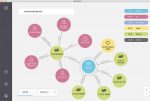
A new initiative is looking to make computer science a core part of K-12 education. The Computer Science Teachers Association, the Association for Computing Machinery, and Code.org are teaming up to create a new framework that defines the appropriate scope and sequence for K-12 computer science.
“Computer science is a literacy: a set of essential skills that are important for students’ learning in school as well as for their future careers and interests,” according to the initiative’s website. “Computer science as a literacy improves students’ ability (and ability to learn) in math, science, and the arts. The goal of this work is not to prepare students to major in computer science or secure jobs as software engineers (although these are likely outcomes), but instead about declaring a baseline level of computer science education that all students should have.”
The framework is expected to be released this summer, and will be designed to identify core computer science and concepts students exiting grades 2, 5, 8 and 12 should know.
In addition to those three organizations, more than 100 advisors within the computing community, as well as state and large school districts, technology companies and other organizations, will be involved in building the framework.
“This work is about defining the basic expectations for what every student should have a chance to learn about K-12 computer science to prepare for the emerging demands of the 21st century,” according to a statement from the organization.
The initiative joins other efforts to make computer science education more accessible to students. Last year, the STEM definition was expanded to include computer science.






